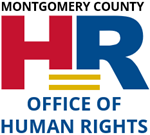Commissions & Committees
Commission on Human Rights
The Commission has 15 members. The members are appointed by the County Executive and confirmed by the County Council. The members are men and women who are broadly representative of the diverse population of the County. Each member serves a 3-year term. The Executive designates a member of the Commission to be chair. The Commission may elect other officers, as it deems necessary. Three members of the Commission serve on the Case Review Board which handles appeals and hearings for discrimination complaints.
The Commission must meet at least once a month for nine months in each calendar year. Eight members of the Commission who are qualified to vote constitute a quorum for the transaction of business and a majority vote of those present at a meeting is required for any official action by the Commission.
The Commission's duties mandate that it work to eliminate discrimination, prejudice, intolerance, and bigotry in housing, recreation, education, health, employment, public accommodations, and justice, regardless of race, color, religious creed, ancestry, national origin, sex, age, marital status, disability, sexual orientation, gender identity, genetic status, presence of children, or source of income, and promote goodwill, cooperation, understanding and human relations among all residents. The members of the Commission serve without compensation.
For more information regarding the Commission on Human Rights, please visit the Commission on Human Rights web page .
Commission on Rememberance and Reconciliation
The Commission on Remembrance and Reconciliation was formed on January 29, 2019, with resolution by Councilmembers Hans Riemer, Will Jawando and Craig Rice. The Commission was established to support the goal of bringing the County together to promote a better understanding of our history. The Commission is composed of community leaders, who will work with the Equal Justice Initiative (EJI) and other stakeholders to help the County claim and install the County's monument commemorating the three locations in the County where racial terror lynchings have been documented. The three lynching victims in Montgomery County were Mr. George Peck (1880), Mr. Sidney Randolph (1896), and Mr. John Diggs-Dorsey (1880). In addition, the Commission will create and install historical markers for each of the three locations, collect and display soil from each of the three locations and design programs to advance the dialogue that the monument, historical markers, and soil collections should foster.
For more information regarding the Commission on Rememberance and Reconciliation, please visit the Commission on Remembrance and Reconciliation web page .
Committee Against Hate/Violence
The County Executive must appoint members to the Committee on Hate/Violence (COHV), subject to confirmation by the County Council. The Committee consists of 15 voting members and six ex-officio, non-voting members. Each voting member must reside in the County. The voting members must broadly reflect the geographic, economic, and social diversity of the County. At least nine voting members should be identified with ethnic or other groups frequently subjected to acts of hate/violence in the County. At least two voting members should be parents of school-age children. At least one voting member should be identified with the County business community. The County Council, Office of the County Executive, Department of Police, Office of Human Rights, Montgomery County Public Schools, and Montgomery College, should each designate a representative to serve as an ex-officio non-voting member of the Committee. Each voting member serves a three-year term. A voting member must not serve more than two consecutive full terms. A member appointed to fill a vacancy serves the rest of the term. Members continue in office until their successors are appointed and qualified. Voting members receive no compensation for their services.
The duties of the COHV are to develop and distribute information about hate/violence, promote educational activities that demonstrate the positive value of ethnic and social diversity; advise the County Council, the County Executive, and County agencies about hate/violence in the County, and recommend such policies, programs, legislation, or regulations as it finds necessary to reduce the incidences of acts of hate/violence.
For more information regarding the Commission on Rememberance and Reconciliation, please visit the Committee Against Hate/Violence web page.
